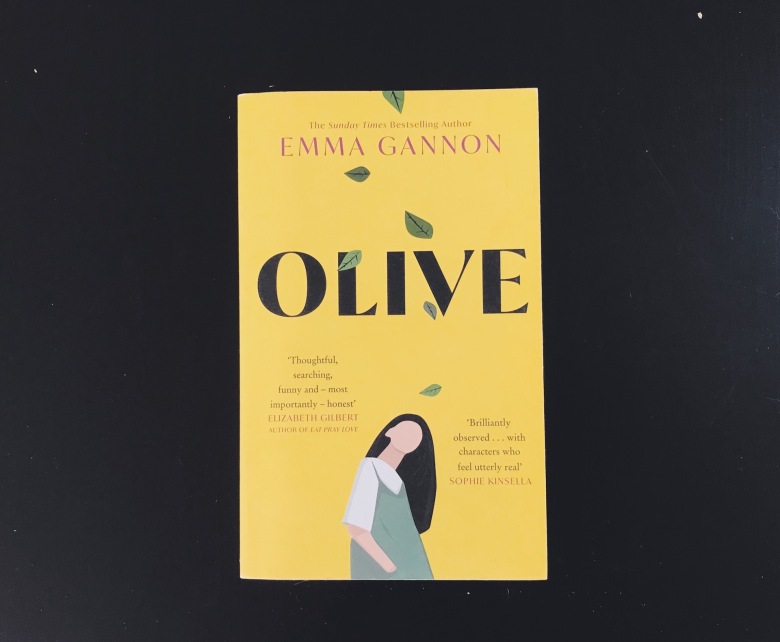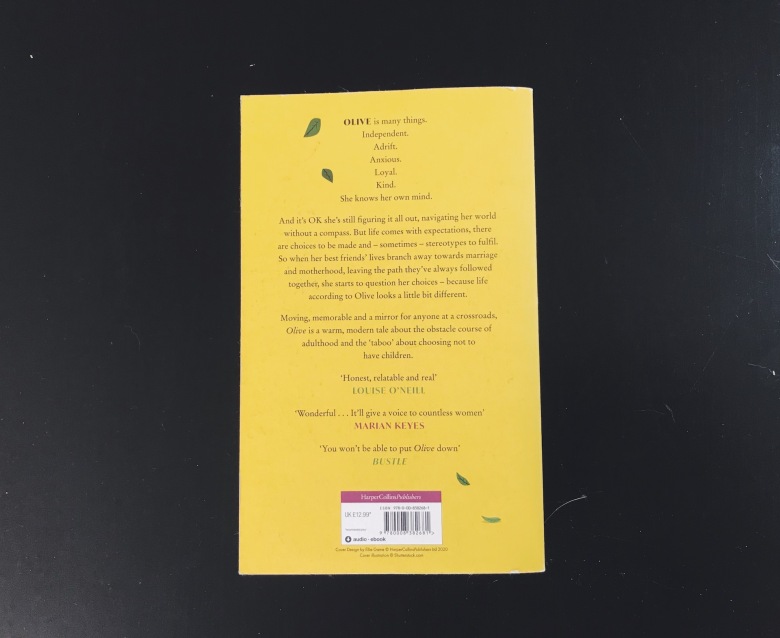
“I was suddenly worried about losing Bea. Terrified that this was the start of the downhill slope. The downhill slope to adulthood and suburbia and staying on the sofa 24/7. Was she going to be getting excited about Tupperware parties next?
It felt like something had shifted. I felt another stab of guilt for judging Bea’s life decisions so harshly. But we all know the fear that once your friends start to grow their family, you might become less needed and, then, fully redundant.”
Emma Gannon’s Olive tells the story of Olive, who is in her early 30s and after ending a nine-year relationship with Jacob because of not wanting children, she feels shaken and emotional. It’s the time in life when one needs her best friends. Olive, Bea, Cecily, and Isla were a tight-knit group since their schooldays. But now that they are ‘real’ grown-ups, everything is different, feels different, and more complicated.
Bea is married with three kids. Cecily is expecting her first kid, and Isla is going through IVFs because she desperately wants a child. Needless to say, Olive feels less than understood and quite alone. This may be the reason she wants to find out why exactly she doesn’t want kids and if this — if she — is healthy and okay, even if she doesn’t want children of her own.
Told in time jumps — when the girls were younger, during Olive’s time with Jacob, and their present-day lives — Emma Gannon constructs the personality of a woman who simply never ticked the way mainstream society expects women to tick. Olive, I feel ya — though I never questioned my non-existent urge to breed.
But what comes naturally to some poses questions for others. Questions Olive not only wants to explore for herself but also for her research into child-free millennial women as a magazine editor. All the while, Olive tries to find her place in the lives of her friends, lives that are so different from hers, thanks to them having or wanting children.
Child-free by choice
From the moment I read about this book I knew I had to get it. I’m happily child-free by choice, so I felt Olive (or Emma Gannon) was talking directly to me. Being in my late 30s, I’ve already seen a bit of breeding and what this means for child-free people — or rather, especially child-free women.
It’s about friends you never see without their kids anymore; friends you have to block on social media because, as a matter of fact, no, your child is not THAT cute and no one needs 50+ baby/toddler photos a week (least of all the kid itself — ever heard of privacy rights?); friends you hardly see anymore because you don’t have kids and they prefer to meet up with other mommy pals as this is “so much nicer for the kids and you wouldn’t find this very interesting anyway” (true); friends with kids who love the fact that you’re child-free because they feel like their old self when spending time with you. And the list goes on — others who are child-free by choice may recognize some things I mentioned in addition to their own experiences.
Don’t for a moment mistake this book to incite anger, ignorance, or misunderstanding against either position. In creating Olive, Emma Gannon opted to focus on a group of women that often get overlooked, especially in mainstream culture, literature, and perception. Women who choose to not have kids, maybe even ending otherwise great relationships because their partners want kids, are hardly ever seen or heard.
Childless women usually ‘have a reason’ for not having kids: biological reasons, mental reasons, never having found the right partner, etc. Women not wanting kids because they simply don’t want the obligations that come with it, don’t like children, and/or prioritize other things in their lives, in short, child-FREE women, hardly ever make mainstream headlines. They are not part of the cultural narrative of a ‘good woman’.
In Emma Gannon’s Olive, we meet such a woman. Someone who has no other reason to not have children than not wanting to procreate.

A different kind of happy ending
With recommendations from Elizabeth Gilbert and Sophie Kinsella on the cover, rest assured that Olive finds the answers she is looking for. Even though some things change, people change, Olive and her friends will find their ways. This sometimes seems a bit too easy, but I appreciate Gannon not opening up additional problem areas, instead focusing on the one main issue. After all, this is no drama, this is a coming-of-later-age book for a millennial child-free by-choice woman.
Olive felt like a friend I miss even though I never met her. I still sometimes feel a bit lost when it comes to old friends. Friends I hardly see anymore because they are moms (and dads). Though I have friends that don’t have kids, it’s not that easy to find them once you’re older than, say, 25, or 30. Especially above 35.
I love my friends, no matter if they have kids or not. But I can only go so far pretending I’m interested in the absolute unbelievable brilliance AND cuteness of their offspring — because, #sorrynotsorry, I don’t really care that much. And reading Olive’s story once again made me feel a bit more okay about this. Because it’s one thing not having kids. It’s another thing for a woman (for heaven’s sake) to NOT CARE about children at all… 🙄
Before I end, let me thank Emma Gannon for taking on one of my favorite arguments when it comes to having kids: the ‘who will take care of you when you are older’ question. Let me quote Olive on this:
‘People who say ‘Oh but who will look after you when you’re old?’ always assume that you’d be friends with your kids later in life, and that they would live in the same country as you. But, actually, they might avoid you like the plague or badly fall out with you. It’s happened to me with my dad. He moved away, left my mum. My relationship with my dad is nonexistent and I don’t think having a baby is a one-way ticket to having forever happiness or a new best friend.
Same here. I have no relationship with my biological father and while I don’t wish him anything bad, I also don’t care about him or want to see him ever again. Having children is no retirement insurance. In a perfect world, a family takes care of one another. In reality, this could be quite different.
Olive by Emma Gannon is a funny and interesting millennial take on women who decide to not have children. While it may lack the philosophical depth that some prefer regarding such important topics, I love its easygoing, ironic, and questioning tone. In the end, it’s not that difficult (referring to child-free by choice): either you want it or you don’t. Whatever it is, it’s fine — you do you 🙂
